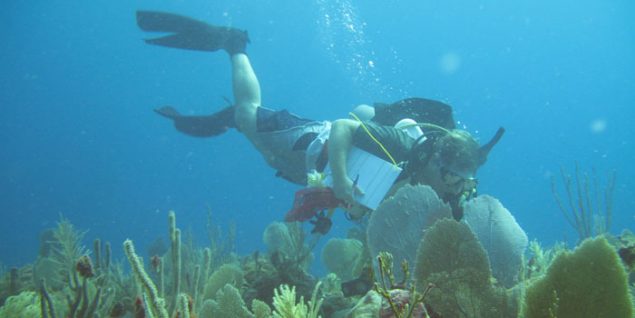You can hear more from Dr. Etnoyer and his journey to become a coral biologist here.

About the Job
What is your title?
I am a Marine Biologist with NOAA’s Coastal Center for Environmental Health and Biomolecular Research (CCEHBR).
Where do you work?
I have an office in Charleston, SC. My research is “in the field,” usually out on a boat somewhere.
Do you travel often?
I travel a lot, both domestically and internationally. I go all over the USA for meetings and conferences. I have also been to Mexico, Venezuela, the Philippines, Panama, Germany, and France.
What are the educational requirements for your job?
You need a doctoral degree (Ph.D.) in one of the marine sciences, e.g. biology, ecology, oceanography, or marine systems science.
What is the salary range for someone with your type of job?
$80,000 to $100,000 per year.
How many hours do you work per week?
40-60 hours per week.
Job Duties
Tell us about your research and the types of things you do.
I look for “sweet spots” in the ocean, places where life is rich and abundant, and then I work with governments and nonprofit organizations to secure protection of those resources for future generations. I have experience with coral reefs, seamounts, and open-ocean or “pelagic” habitats. Most everything I do relates to the fact that in 1986, the United Nations granted nations exclusive rights to all territorial waters within 200 miles of their coasts. International law allows coastal nations to manage the resources they value, whether it be coral reefs, fisheries or energy resources.
What is the most fascinating thing you have ever seen or done?
The most fascinating thing I have done lately is to drive a robot through 1,500 ft of water looking for deep-sea corals in the Gulf of Mexico. That was incredible.
I must say, though, that the most intense moments I have had are encounters with big fish, turtles, sharks and mammals. These animals have thoughts and feelings, and you can sense that. Every time I go underwater, I feel like I am visiting an alien world.
What are the personal rewards of your work and how does your work benefit the public?
I help federal governments plan for the future of their marine resources. My personal reward is to start with a big unknown, bring new results to light, and share them with marine managers so that they can help their governments secure the resources for future generations. Most of science is about looking for the truth, and being able to quantify the truth so that we can make better decisions as a society. When I say “quantify the truth,” I mean running analyses that provide statistics.
In the Pacific, we found deep-sea corals as deep as 3,000 m. That is important to know. There is life in the deep sea, so we need to respect that. I would like to be able to use this information to balance our human rights to survival, progress, clean water and recreation with other species’ right to exist. Our society benefits from clean water and healthy marine life the same way our neighborhoods benefit from clean parks, forests and wildlife.
What else could someone with your background do?
I could teach or work at a public aquarium. I worked in construction before and after college, and then I worked on movies for 10 years after college. Then I returned to graduate school for marine science. If the oceans dried up, I suppose I could always go back to making videos or remodeling houses!

